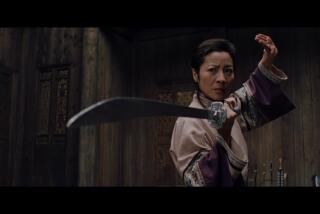MOVIE REVIEW : ‘Red Lantern’ Timely and Shattering
- Share via
Zhang Yimou’s Oscar-nominated “Raise the Red Lantern” (at the Royal), which takes us into the cloistered household of a Northern Chinese nobleman in the 1920s, is a film of astonishing beauty and terror that has the impact of a Greek or Shakespearean tragedy.
Not even “Red Sorghum” and “Ju Dou,” the two previous films that have established Zhang as China’s most daring and exciting director, prepare us fully for this calmly shattering film, in which the visual and the dramatic become one to a greater, richer extent than ever before in his work.
“Raise the Red Lantern,” which Ni Zhen adapted from a novel by Su Tong, takes its title from a custom in the ancient compound of the Chen family, a huge complex of grayish-brown structures with tile roofs, all connected with courtyards. Each day servants place a red lantern, suspended from a tripod, before the entrance to the quarters of the wife favored by the master that evening. As dusk approaches, the servants go through the ritual of lighting all the red lanterns surrounding the chosen wife’s courtyard and also those that light the interior of her elegant quarters.
Entering this sealed-off world is a pretty, confident but fatally naive 19-year-old, Songlian (Gong Li), who has accepted a proposal from the 50ish Chen Zuoqian (Ma Jingwu) to become his No. 4 wife in order to escape a despised stepmother. Wife No. 1 (Jin Shuyuan), looking older than her years, has resigned herself to a life of neglect after having produced a male heir, now in college. Wife No. 2 (Cao Cuifeng), although approaching middle age, still hopes to present the master with a son, having given birth to a “useless” daughter. Wife No. 3 (He Caifei) is a glamorous, frivolous former opera singer, who has given Chen another son.
Songlian is immediately thrust into a totally treacherous household for which she is ill-prepared but one in which she foolishly believes she can prevail over. Yet this is a milieu of endless power plays in which a rival can possess “the face of a Buddha but the heart of a scorpion” and no servant is to be trusted.
This film is about as harrowing a portrait of the systematic oppression of women as imaginable. The wives have no more rights than their servants. Their indolent lives are as atrophied as the feet of Chinese women who have had theirs bound in childhood; how the women in this film escaped that traditional cruel fate is unexplained. Their sole purpose in life is to serve men and produce male heirs. Yet it is possible to see ourselves in these women, each of whom is flawlessly portrayed, both in their very human yearnings and in their potential for destruction to themselves and others.
Every frame of “Raise the Red Lantern” is expressive of the incredibly narrow lives of its women and of Songlian’s fate in particular. Cinematographer Zhao Fei’s compositions are rightly exceedingly formal, as rigid as the rules that dictate the women’s existence.
As in his previous films, Zhang reveals himself to be a supreme colorist; in this instance, the intense symbolic red of the lanterns stand out like blood stains on the dun-colored earthen exteriors. “Raise the Red Lantern” (Times-rated Mature for adult themes) is set safely in the past, yet in its implications seems as timely as Tian An Men Square. Indeed, Zhang has been reported as courageously saying, “I am not suggesting that people still live this way, only that they still think this way.”
‘Raise the Red Lantern’
Gong Li: Songlian
Cao Cuifeng: Zhouyan
He Caifei: Meishan
Kong Lin: Yan’er
An Orion Classics release of an ERA International (Hong Kong) Ltd. presentation in association with China Film Co-Production Assn. Director Zhang Yimou. Executive producers Hou Hsiao-Hsien, Zhang Wenze. Screenplay Ni Zhen, from a novel by Su Tong. Cinematographer Zhao Fei. Editor Du Yuan. Costumes Huang Lihua. Music Zhao Jiping. Art directors Cao Jiuping, Dong Huamiao. Sound Li Lanhua. In Mandarin, with English subtitles. Running time: 2 hours, 5 minutes.
Times-rated Mature (for adult themes).
More to Read
Only good movies
Get the Indie Focus newsletter, Mark Olsen's weekly guide to the world of cinema.
You may occasionally receive promotional content from the Los Angeles Times.









